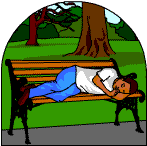Sleep
Created | Updated Jun 26, 2009

Sleep involves lying down on a (preferably) smooth, comfortable surface, closing one's eyes and lowering one's breathing and heart rate for around ten minutes to ten hours, usually, but not always at night. Human beings spend, on the average, about one third of their lives in this condition, and is often referred to as 'catching some Zzzzz's' or '40 winks'.
Sleep serves as a method of rejuvenating the body from its hours of consciousness. The sensation of sleeping is much like death (at least one would imagine so). However, unlike dying, sleep occurs with much less permanence.
When someone goes to sleep, they don't tend to remember the experience. It's a strange feeling. One goes to sleep, and then suddenly one is awake. There is a sensation that time has passed, and yet its only been a moment or less of consciousness between waiting for oblivion to take over and squinting at the morning sun, shining through the windows.
Perhaps the only true indication that anything has happened at all are dreams. Dreams are strange regurgitations and manifestations of thoughts, somehow brought about while slumbering. No one quite knows what purpose dreams serve, or why we have them, even though countless individuals from a diverse range of vocational fields have explored the possibilities. Dreams certainly seem necessary and can be quite entertaining, especially if one becomes successful at lucid dreaming.
Ideally, the best place to sleep is on a bed, which is a horizontal surface containing a mattress and springs, and is covered by linen or cotton sheets and duvets or woollen blankets, designed to keep you warm. Optionally, sleepers can wear sleepwear when in bed.
The following are excellent places to sleep, when a bed it not available:
Under dumpsters - as long as it isn't trash day the next day.
On park benches - so long as you don't mind having your possessions taken away from you by the next morning.
Convenience stores - that are open 24 hours day, behind large boxes.
Hospitals - you can normally sneak in and get a few hours kip before the staff notice you're there.
On trains and while travelling generally.
Failing to sleep regularly tends to have adverse side-effects on the non-sleeper.
Going without sleep for long periods of time can lead to many symptoms. Most human beings can go for 16 to 20 hours without sleep. After 20 hours, the first symptoms are usually listfulness, a noticeable kinetic energy depletion in the extremities, lack of mental focus on complex activities, and irritability. A tendency for the eyes to droop and the head to become limp briefly are also indications. Operating heavy machinery (like driving) without sufficient sleep should definitely be avoided.
Mood swings tend to increase after a full 24-hour period without sleep is reached, and even the simplest of activities can become cumbersome. If the mind refuses to allow the body to rest beyond this period, the subject can display zombie-like characteristics. While, dementia, hallucinations, and increased levels of crankiness and irritability occur as a sleep-deprived person approaches over 48 hours without sleep.
It is believed sleep deprivation for more than 72 hours straight can lead to schizophrenia and irreversible brain damage. Although the scientific results are still inconclusive.

